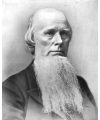B

Foster Blodgett
Jackson Bond
George Brosius

Joseph Mackey Brown
Joseph Mackey Brown (December 28, 1851–March 3, 1932) was the 59th governor of Georgia and served two terms, one from 1909 to 1911 and the other from 1912 to 1913. He has been implicated posthumously as one of the leaders involved in the lynching of Leo Frank.
Brown, also known as “Little Joe Brown,” was born in Canton, Georgia, the son of Joseph E. Brown, Georgia’s Civil War Governor. After graduating from Oglethorpe University in 1872, he studied law at Harvard University. Although Brown passed the bar in 1873, but never practiced law because of poor eyesight. Later, he attended a business college in Atlanta, Georgia, and became a clerk with the Western and Atlantic Railroad and eventually the traffic manager.
In 1904, Governor Joseph M. Terrell appointed Brown to the Georgia State Railroad Commission. In 1907, Governor Hoke Smith removed Brown over disagreements about passenger fares.

Joseph Emerson Brown
Julius L. Brown
Julius L. Brown was a well-known attorney from Atlanta, Georgia. He was also one of the founders of the Metropolitan Street Railroad and the brother of Georgia’s governor and senator, Joseph E. Brown.
Brown was born in Canton, Georgia, on May 31, 1848. He enlisted in the Confederate States Army in 1864 and served until the Civil War ended.
He attended Georgia State University and was admitted to the bar in September 1869. Later, in June 1870, he graduated from Harvard Law School. Brown became the Western and Atlantic Railroad general counsel in 1872.
He lived in the Washington–Rawson neighborhood in Atlanta, which no longer exists, and passed away there on September 4, 1910.
Charles E. Broyles
Charles E. Broyles joined the Western & Atlantic Railroad circa 1868.
Born in Springfield Place in Whitfield County, Georgia, he was the son of Colonel C.E. Broyles, an attorney in Dalton who served during the Civil War, rising to the rank of colonel.
The younger Broyles received his education in Dalton and furthered his studies at Emory and Henry College in Virginia. He served for two years as a representative in the Georgia legislature for Whitfield County. He also once served as the editor of The Catoosa Record.
In February 1871, he broke his left leg and right arm trying to fix a broken coupling on a southbound freight train just below Kingston.
In about December 1882, he was promoted from freight conductor to passenger conductor.
On Dec. 15, 1888, he was appointed soliciting agent for the Western & Atlantic, based in Chattanooga, Tenn.
In later years, Mr. Broyles retired from active business life, spending winters in Florida in hopes of regaining his health. He was well-known and liked throughout the state, with many friends who admired his contributions to the community.
